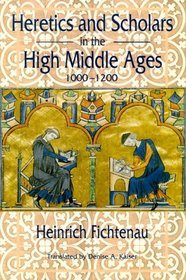Search -
Heretics and Scholars in the High Middle Ages: 1000-1200
Heretics and Scholars in the High Middle Ages 1000-1200
Author:
A Bookman News Exceptional Book of 1998 An intellectual portrait of Europe in the High Middle Ages by one of the great medievalists of this century. “A book that should be read by all those interested in heresy as well as medieval theology.”—Church History “Originally published in German in 1991, this latest work by Fichte... more »
Author:
A Bookman News Exceptional Book of 1998 An intellectual portrait of Europe in the High Middle Ages by one of the great medievalists of this century. “A book that should be read by all those interested in heresy as well as medieval theology.”—Church History “Originally published in German in 1991, this latest work by Fichte... more »
ISBN-13: 9780271017655
ISBN-10: 0271017651
Publication Date: 6/1998
Pages: 403
Rating: ?
ISBN-10: 0271017651
Publication Date: 6/1998
Pages: 403
Rating: ?
0 stars, based on 0 rating
Publisher: Pennsylvania State University Press
Book Type: Hardcover
Other Versions: Paperback
Members Wishing: 0
Reviews: Amazon | Write a Review
Book Type: Hardcover
Other Versions: Paperback
Members Wishing: 0
Reviews: Amazon | Write a Review
Genres:
- History >> Europe >> England >> General
- History >> Europe >> General
- History >> World >> Medieval
- Religion & Spirituality >> Religious Studies >> History




